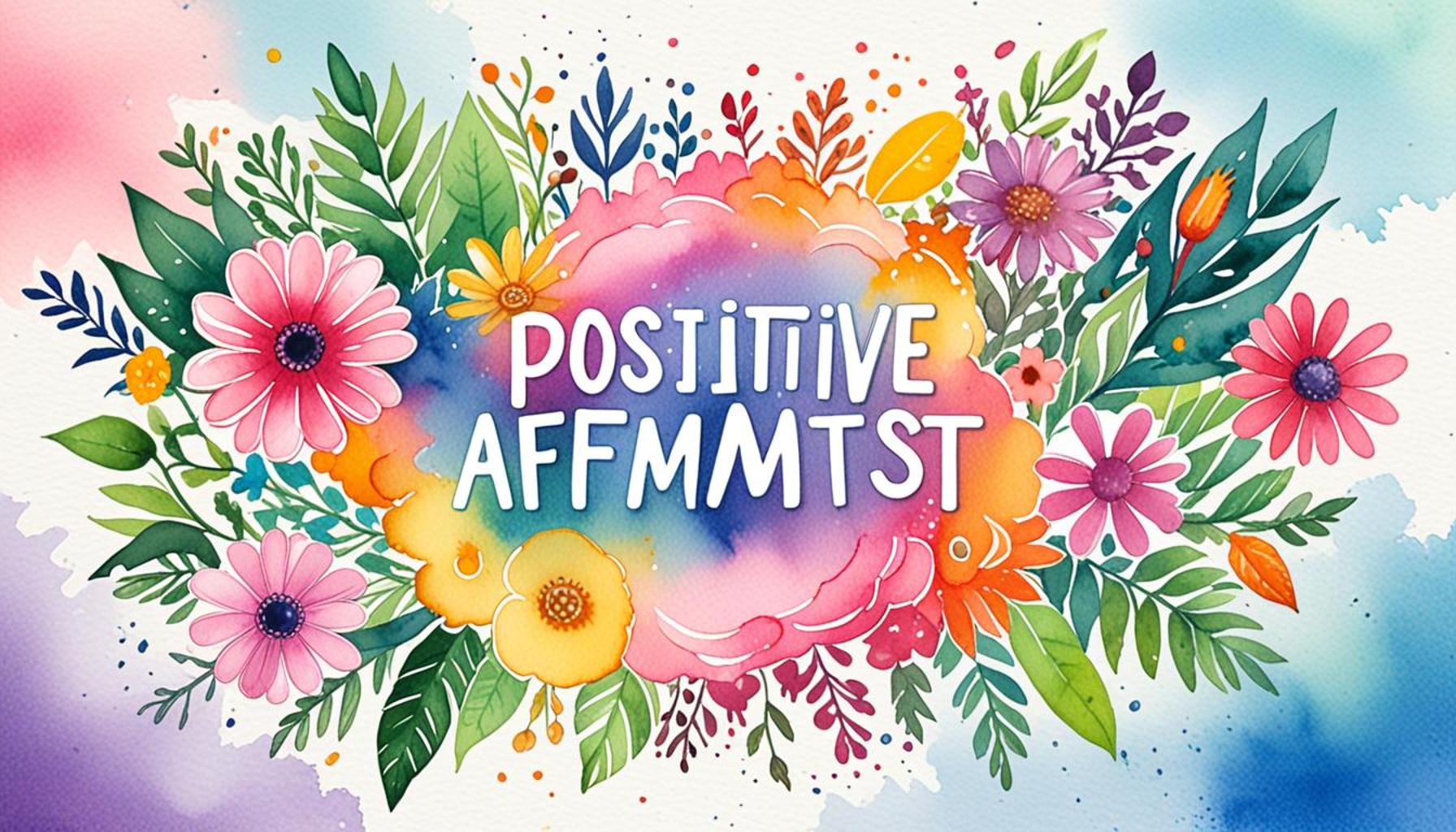The Role of Positive Affirmations in Promoting Emotional Balance: Cultivating Inner Peace and Self-Compassion

The Role of Positive Affirmations in Daily Life
In today’s fast-paced society, where challenges and stressors proliferate, many individuals are increasingly turning to positive affirmations as a beacon of hope and a tool for managing their mental well-being. These simple yet powerful statements can foster a sense of emotional balance and serve as an antidote to negativity. The beauty of positive affirmations lies in their accessibility; they are easy to integrate into daily routines, requiring nothing more than the willingness to change one’s mindset.
In Nigeria, where the pressures of everyday life—from financial uncertainties to social expectations—can often feel overwhelming, embracing the benefits of positive affirmations becomes even more crucial. Here are some practical advantages of incorporating these affirmations into daily life:
- Enhancing self-esteem – Constant exposure to negative messages, whether from societal expectations or personal experiences, can diminish one’s self-worth. Affirmations such as “I am capable of achieving my goals” serve to counteract this damaging self-talk and foster a more positive self-image.
- Building resilience – In a country that faces its share of challenges, from economic fluctuations to personal adversities, affirmations like “I am strong and can face any challenge” encourage individuals to develop a mindset that embraces difficulties rather than shies away from them. This resilience can be a game-changer in navigating life’s ups and downs.
- Encouraging self-compassion – During difficult times, it is easy to become your own harshest critic. Affirmations such as “I deserve love and understanding” promote a sense of kindness towards oneself, fostering a gentler approach to handling personal failures and disappointments.
Research underscores the significance of positive affirmations, asserting they are not merely whimsical phrases but rather cognitive tools that can lead to tangible improvements in emotional health. Studies have shown that when individuals practice affirmations consistently, they can experience profound changes in their overall life satisfaction and emotional well-being.
Implementing positive affirmations into daily routines can be simple yet effective. Start each morning by repeating your chosen affirmations aloud while looking in the mirror, or write them down in a journal. This practice can set a positive tone for your day, encouraging optimism and a sense of control. As you embark on this journey toward self-compassion and emotional harmony, remember that the words you choose to embrace can create a powerful mental landscape, reshaping not only your thoughts but also your entire approach to life’s challenges.
Take time to explore various affirmations that resonate with your personal experiences and aspirations. Whether you adapt popular ones or create your own, the transformative power of words is within your reach, waiting to envelop you in a newfound sense of peace and motivation.

CHECK OUT: Click here to explore more
Understanding the Impact of Positive Affirmations
Positive affirmations serve as a vital tool in the quest for emotional balance, offering individuals a pathway to enhance self-compassion and cultivate a deeper sense of inner peace. This concept is especially relevant in Nigeria, where the societal fabric is woven with unique pressures and expectations that can lead to heightened levels of stress and anxiety. Acknowledging this, the use of positive affirmations provides not only personal empowerment but also a method of healing from the emotional turmoil that many face daily.
The science behind positive affirmations suggests that the human mind is remarkably responsive to language. When individuals engage in self-affirming practices, the brain’s neural pathways begin to rewire, leading to improved mental health outcomes. Psychological studies indicate that consistently practicing positive affirmations can help mitigate feelings of inadequacy and self-doubt, which can manifest as stress-related issues. This transformative power of words creates a ripple effect that influences not only individual well-being but also interpersonal relationships, fostering a culture of support and positivity.
In a country as diverse and vibrant as Nigeria, where community and connection play significant roles, the importance of affirmations extends beyond the self. Cultivating a practice of positive affirmations can encourage collective emotional resilience among families and communities. Here are some key benefits that positive affirmations have been found to provide:
- Promoting positive self-talk – Individuals often battle negative inner dialogues that undermine their confidence. Repeating affirmations like “I am worthy of respect and love” can help replace those debilitating thoughts with a more supportive internal narrative.
- Reducing stress and anxiety – By affirming statements such as “I am calm and in control,” individuals can shift their focus from anxiety-triggering situations to a state of tranquility, thus enabling better stress management.
- Improving overall mental well-being – Positive affirmations can lead to enhanced mood and increased feelings of happiness. For example, saying “Every day, in every way, I am getting better” reinforces a growth mindset, making individuals more adaptable to life’s challenges.
These affirmations do more than inspire quick bursts of positivity; they lay the foundation for sustainable emotional health. By consistently practicing positive affirmations, individuals not only foster a healthier self-image but also experience long-lasting effects on their emotional landscape. The connections forged through the practice of affirmations enable people to navigate their life circumstances with courage and self-acceptance, vital components in the journey towards emotional equilibrium.
Incorporating positive affirmations into daily life can be an enlightening practice filled with potential for personal growth. As individuals explore various affirmations that resonate with their experiences, they may find that this simple act enhances their journey toward emotional balance and an overall sense of well-being.
| Advantages | Impact on Emotional Well-Being |
|---|---|
| Enhances Self-Compassion | By embracing positive affirmations, individuals foster a kinder relationship with themselves, reducing self-criticism. |
| Promotes Emotional Resilience | Affirmations help build a buffer against stress, enabling individuals to cope better with challenges. |
| Increases Mindfulness | Practicing affirmations encourages present-moment awareness, leading to a deeper inner peace. |
| Reduces Anxiety | Utilizing affirmations can counter negative thought patterns, thus alleviating feelings of anxiety. |
Positive affirmations can significantly contribute to emotional balance by enhancing self-compassion. These affirmations serve as reminders to treat oneself with kindness, thus minimizing the impact of harsh self-judgment. When individuals adopt positive affirmations in their daily routine, they report increased emotional resilience, which allows them to tackle life’s challenges more effectively. This newfound resilience is paramount in navigating stressors.Moreover, engaging with positive affirmations heightens mindfulness, as it trains individuals to remain present and focused. Such practice fosters a sense of inner tranquility that is hard to achieve amidst daily chaos. Additionally, by counteracting negative self-talk, affirmations play a crucial role in reducing anxiety, leading individuals to embrace a more hopeful outlook on life. These transformations are not merely anecdotal; numerous studies highlight the genuine psychological benefits of implementing positive affirmations for those seeking emotional balance.
CHECK OUT: Click here to explore more
Implementing Positive Affirmations for Daily Transformation
To fully harness the benefits of positive affirmations, a thoughtful approach is necessary. It’s not just about reciting phrases; rather, it’s about integrating these affirmations into the fabric of daily life, allowing them to become a genuine aspect of one’s emotional routine. This integration is especially crucial in a culturally rich nation like Nigeria, where daily life is often accompanied by societal pressures and expectations that can impede personal growth. Here, the conscious employment of positive affirmations can pave the way for profound personal transformation.
A popular method among practitioners involves writing down affirmations and placing them in prominent locations. For instance, individuals might consider writing affirmations such as “I am capable of overcoming obstacles” on sticky notes and positioning them on mirrors, refrigerators, or work desks. This tactic not only serves as a daily reminder but also reinforces a positive mindset, encouraging individuals to internalize these affirmations through frequent exposure.
Moreover, establishing a designated time for affirmation practice can enhance its effectiveness. Morning routines, or moments of tranquility during the day, provide ideal opportunities for individuals to engage deeply with positive affirmations. Reciting phrases like “I embrace my uniqueness and value my contributions” during these moments encourages introspection and mindfulness, cultivating feelings of self-acceptance.
In Nigeria, community support remains vital for emotional well-being. Therefore, sharing positive affirmations in social circles, such as family gatherings or community groups, can amplify the experience. Group activities centered around affirmations—perhaps incorporating traditional practices like storytelling or cultural songs—can enhance their emotional impact. Such communal practices can foster an environment where individuals are encouraged to uplift one another, creating a shared commitment to emotional balance.
As technology continues to permeate daily life, many individuals have begun utilizing affirmations through digital means, such as mobile apps designed for mindfulness. These platforms often provide a customized experience, challenging users with daily affirmations that align with their goals and emotional needs. The convenience of accessing affirmations through smartphones or tablets ensures that users can incorporate positive reinforcement whenever necessary, making emotional wellness more accessible across different demographics.
Furthermore, the adaptability of positive affirmations allows them to address specific emotional challenges faced in Nigeria. For example, during times of economic uncertainty, affirmations such as “I trust my ability to thrive in any circumstance” can provide individuals with a sense of security and resilience. By tailoring affirmations to address unique stressors, individuals can build a toolbox of emotional resilience that resonates deeply with their lived experiences.
Studies also suggest that following positive affirmations with actionable steps increases their effectiveness. For instance, after affirming a belief in one’s self-worth, individuals can take tangible actions, such as seeking educational opportunities or engaging in community service, which can further reinforce that affirmation. This practical approach not only nurtures self-compassion but also establishes a purposeful mindset aimed at fostering inner peace.
Ultimately, the role of positive affirmations in promoting emotional balance is a journey that requires commitment and genuine practice. As Nigerians continue to navigate the complexities of life, embracing the power of affirmations can cultivate a constructive emotional landscape, thus enhancing overall well-being and self-acceptance.
YOU MAY ALSO LIKE: Read read another article
Conclusion: Embracing the Power of Positive Affirmations
In today’s fast-paced and demanding world, the significance of positive affirmations in fostering emotional balance cannot be overstated. By weaving these affirmations into daily routines, individuals in Nigeria and beyond can create a reliable foundation for personal growth and resilience. The journey towards inner peace and self-compassion begins with recognizing the transformative potential of the words we choose to embrace. From cultivating self-acceptance to developing a sense of communal support, affirmations hold the key to navigating the complexities of life with grace.
As we have explored, the methods for implementing affirmations are versatile and adaptable, making them accessible to anyone seeking to enhance their emotional well-being. By personalizing affirmations to address specific cultural and situational challenges, individuals can fortify their sense of self and navigate external pressures more effectively. Importantly, the simultaneous engagement with actionable steps ensures that positive affirmations lead to tangible results, thereby reinforcing positive beliefs and fostering a mindset tailored for success.
In conclusion, the embrace of positive affirmations is more than mere self-encouragement; it is a commitment to nurturing a supportive emotional landscape that encourages personal development. As individuals in Nigeria continue to face societal pressures, the consistent application of positive affirmations can serve as a profound instrument for cultivating emotional balance, ultimately guiding them toward a path of inner peace and enhanced self-compassion. The time to start this journey is now, and by doing so, we can not only uplift ourselves but also inspire those around us to join in pursuit of emotional well-being.



